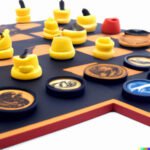Classic family card and board games have been a staple in households for generations, providing hours of fun and entertainment for all ages. These timeless games have the power to bring families together, creating lasting memories and strengthening bonds. In today’s fast-paced digital world, it is crucial to recognize the value of these classic games and their ability to enhance communication skills, promote learning, and revive traditional family traditions.
In this article, we will delve into the importance of classic family card and board games and explore the numerous benefits they offer. We will discuss how playing these games can enhance bonding among family members while improving essential communication skills. Additionally, we will take a detailed look at the top 10 classic family card games that every household should have in their collection.
Furthermore, we will explore the joy of traditional board games and how they provide a unique form of entertainment that has stood the test of time. Not only do these games offer endless fun, but they also possess educational aspects that improve cognitive skills in players of all ages.
Whether you are organizing a classic game night or looking for ways to pass down generational traditions, this article aims to provide valuable tips and insights on how to create memorable moments with your loved ones. So grab your favorite deck of cards or dust off that old board game from the shelf because it’s time to embrace the timeless joy of classic family card and board games.
Benefits of Playing Classic Family Card and Board Games
When it comes to classic family card and board games, the benefits extend far beyond simple entertainment. These games have proven to be effective tools for enhancing bonding and communication skills within the family unit. In today’s fast-paced digital age, where everyone is often engrossed in their own devices, playing these games together can create opportunities for quality time and meaningful interactions.
One of the key benefits of playing classic family card and board games is the enhancement of bonding among family members. When individuals sit down to play a game together, they engage in a shared experience that promotes camaraderie and connection. Whether it’s strategizing in a game of chess or laughing over a round of Uno, these activities foster a sense of togetherness that may be lacking in other aspects of daily life.
Moreover, these games also provide an avenue for improving communication skills within the family. As players navigate through different challenges and scenarios presented by the game, they must effectively communicate with each other to convey strategies, make decisions, and coordinate efforts. This encourages active listening skills, collaboration, and problem-solving abilities. By engaging in these types of conversations during gameplay, families can strengthen their ability to communicate effectively with one another outside of game nights as well.
Ultimately, incorporating classic family card and board games into regular routines can have lasting positive effects on the overall dynamics within a household. These activities create an opportunity for families to bond and communicate on deeper levels while having fun together.
So why not gather around the table and rediscover the joy that these timeless games bring? It’s time to put away the screens for a while and embrace the enriching benefits that come from playing classic family card and board games.
Top 10 Classic Family Card Games
Card games have been a popular form of entertainment for centuries, and they continue to be a beloved activity for families today. Whether you’re gathered around the kitchen table or sitting outside on a sunny afternoon, classic family card games provide endless hours of fun and excitement. In this section, we will take a detailed look at the top 10 classic family card games that are sure to bring joy and laughter to your family game nights.
- Go Fish: This simple yet engaging game is perfect for young children who are just learning how to play cards. The objective is to collect sets of four cards by asking other players if they have a specific card that you need.
- Crazy Eights: This fast-paced game is all about getting rid of your cards as quickly as possible. Each player takes turns playing a card that matches the rank or suit of the previously played card.
- Old Maid: A favorite among children, this game involves trying to avoid being left with the “old maid” card. Players take turns swapping cards, trying to make pairs and discard them until one player is left holding the old maid.
- Rummy: A classic card game that requires strategic thinking and memory skills, Rummy involves forming sets or runs of cards and adding up their point values.
- Poker: One of the most popular card games worldwide, Poker is played with a standard deck of 52 cards and involves betting on the strength of each player’s hand.
- Spades: In this trick-taking game, players bid on how many tricks they think they can win in each round. The objective is to fulfill your bid while also preventing your opponents from reaching theirs.
- Solitaire: Perfect for solo play, Solitaire is played with a single deck of cards and involves arranging them according to specific rules and patterns.
- Bridge: Known for its complexity and strategic depth, Bridge requires four players working in partnerships to take tricks and accurately bid on how many they can win.
- Hearts: A game of strategy and careful planning, Hearts involves trying to avoid taking certain cards that carry penalty points.
- Uno: While not technically a traditional card game, Uno has gained immense popularity over the years as a family favorite. The objective is to be the first player to play all of your cards while strategically using action cards to disrupt your opponents’ progress.
These top 10 classic family card games are just a taste of the wide variety of options available. From simple and quick games for younger players to more complex ones that require strategic thinking, there’s a card game suitable for every age and skill level. Whether you prefer competitive gameplay or cooperative fun, these classic card games are sure to bring enjoyment to your family gatherings. So grab a deck of cards and get ready for hours of entertainment.
| Card Game | Number of Players | Objective |
|---|---|---|
| Go Fish | 2-6 players | To collect sets of four cards by asking other players if they have a specific card. |
| Crazy Eights | 2-7 players | To get rid of all your cards by playing matching ranks or suits. |
| Old Maid | 2 or more players | To avoid being left with the “old maid” card by discarding pairs. |
Exploring the Timeless Fun of Traditional Board Games
Traditional board games have been a source of joy and entertainment for families for many generations. They offer a unique way to bring people together, creating opportunities for fun and bonding. In this section, we will explore the timeless fun that traditional board games provide and why they continue to be popular in today’s digital age.
The Nostalgic Appeal
One of the reasons traditional board games hold such enduring appeal is their ability to evoke feelings of nostalgia. Many people have fond memories of playing these games with loved ones during their childhood. The familiar feeling of opening up a game box, setting up the board, and engaging in friendly competition brings back cherished memories and creates new ones for future generations.
The Social Interaction
Unlike their digital counterparts, traditional board games require face-to-face interaction among players. Sitting around a table, taking turns, discussing strategies, and reacting to each other’s moves fosters social interaction and communication skills. These games encourage players to engage in conversation, negotiate deals, and work together towards a common goal. This social aspect not only enhances bonding within families but also promotes important life skills such as teamwork, problem-solving, and decision-making.
The Variety of Choice
Another reason traditional board games have stood the test of time is their sheer variety. From strategy-based games like chess and Risk to luck-driven games like Snakes and Ladders or Sorry., there is a game to suit every player’s preferences.
Traditional board games cater to all ages and interests, ensuring that there is always something enjoyable for the entire family to play together. Additionally, many classic board games have been adapted into modern versions or themed editions, providing even more options for players to explore.
Educational Aspects of Classic Family Card and Board Games
Classic family card and board games offer more than just entertainment; they also provide an opportunity for players to enhance their cognitive skills. In this section, we will explore the educational aspects of these games and how they can help improve various cognitive abilities.
Critical Thinking and Problem-Solving
When playing classic family card and board games, individuals are constantly faced with decision-making situations that require critical thinking and problem-solving skills. Games such as chess, Scrabble, and Settlers of Catan, require players to strategize, analyze different possibilities, make quick decisions, and adapt their strategies based on changing circumstances. By engaging in these games regularly, individuals can develop their analytical thinking abilities and sharpen their problem-solving skills.
Memory and Recall
Many classic family card and board games involve elements of memory and recall. For instance, in games like Memory or Concentration, players have to remember the positions of cards on the board to match pairs. By engaging in these types of games frequently, individuals can improve their memory skills by enhancing their ability to store information in short-term memory as well as retrieve it when needed.
Numeracy Skills
Classic family card and board games often incorporate numerical elements that can help players improve their numeracy skills. Games like Monopoly or Yahtzee involve counting money or adding up scores, requiring players to perform mental calculations quickly and accurately. By regularly engaging in these types of games, individuals can boost their numerical fluency and enhance their ability to mentally calculate.
Tips for Organizing a Classic Game Night
Organizing a classic game night can be a wonderful way to create lasting memories and strengthen the bond between family members. Here are some tips to help you plan and execute a successful evening of classic family card and board games:
- Choose a Variety of Games: To cater to different preferences and ages, it’s important to have a variety of games available. Consider selecting a mix of card games, such as Poker or Uno, and board games like Monopoly or Scrabble. By offering different options, everyone in the family can find something they enjoy.
- Create a Comfortable Environment: Set up a designated area for game night that is comfortable and inviting. Make sure there is enough seating for everyone and provide cushions or blankets for extra coziness. Dim the lights, light some candles, and play soft background music to create a relaxing atmosphere.
- Plan Refreshments: No game night is complete without snacks. Prepare some finger foods like popcorn, chips, or veggie sticks with dip. You can also consider ordering pizza or making homemade nachos for a heartier option. Don’t forget to have plenty of drinks on hand as well.
- Establish Clear Rules: Before diving into the games, take some time to establish clear rules that everyone agrees on. This will help avoid any confusion or disagreements during gameplay. Make sure to explain the objectives of each game so that everyone understands how to play.
- Encourage Communication and Sportsmanship: Classic family card and board games provide an opportunity for communication and friendly competition among family members. Encourage everyone to engage in conversation during gameplay, whether it’s strategizing together or simply enjoying each other’s company. Emphasize the importance of good sportsmanship and remind everyone that winning isn’t everything – it’s about having fun together.
By following these tips, you can organize a classic game night that creates memorable moments for your entire family. Whether it’s laughter-filled rounds of charades or intense battles over a game of Risk, game nights can become cherished traditions that bring the family closer together. So gather your loved ones, set aside some time, and get ready for a night of classic family fun.
Classic Family Card and Board Games for All Ages
Classic family card and board games hold a special place in the hearts of people of all ages. These timeless games have the amazing ability to bring together family members across generations, creating cherished memories and fostering a sense of togetherness. From kids to grandparents, everyone can find enjoyment in playing these classic games.
One of the reasons classic family card and board games are loved by all ages is their accessibility. Many of these games are easy to learn and play, making them suitable for young children as well as older adults. The simple rules and straightforward gameplay ensure that everyone can participate and have a good time. In addition, these games often feature varying levels of complexity, allowing players of different skill levels to engage in friendly competition.
Furthermore, classic family card and board games provide an opportunity for intergenerational bonding. Playing these games offers a chance for grandparents to pass on their knowledge and expertise to younger family members while also creating opportunities for deeper conversations and connections between different generations. It brings families closer together as they spend quality time engaging in friendly competition, laughter, and shared experiences.
Not only do these games promote bonding, but they also offer valuable educational benefits for players of all ages. Card and board games help develop critical thinking skills, strategic planning abilities, problem-solving techniques, and decision-making capabilities.
Moreover, they enhance important life skills such as patience, sportsmanship, teamwork, communication skills, and good decision-making under pressure. Classic card and board games are not only a source of entertainment but can also serve as powerful tools for learning and personal growth across all age groups.
Reviving the Tradition
In recent years, there has been a resurgence in the popularity of classic family card and board games. While technology has made its way into nearly every aspect of our lives, these traditional games have managed to withstand the test of time. This revival can be attributed to several factors.
Firstly, classic family card and board games offer a unique opportunity for bonding and quality time with loved ones. In today’s fast-paced world, it can be challenging to find activities that allow families to come together and connect on a deeper level. These games provide an excellent platform for building relationships, fostering communication skills, and creating lasting memories.
Secondly, classic family card and board games offer a break from screen time and digital entertainment. With the prevalence of smartphones, tablets, and video games, many people are seeking alternatives that promote face-to-face interaction. These traditional games not only encourage healthy competition but also provide a much-needed reprieve from screens and technology.
Moreover, the nostalgic appeal of classic family card and board games is undeniable. Many adults fondly remember playing these games during their own childhoods. Introducing them to younger generations allows for a sense of continuity and tradition. There is something comforting about passing down these timeless games through the generations.
To further understand this resurgence in popularity, let’s take a closer look at some specific examples of classic family card and board games that have witnessed increased interest in recent years:
- Uno: A classic card game that requires strategy and quick thinking.
- Monopoly: The beloved board game that teaches financial literacy while providing hours of fun.
- Scrabble: A word game that challenges players’ vocabulary skills while promoting healthy competition.
- Chess: A strategic game that stimulates critical thinking and problem-solving abilities.
- Clue: A thrilling murder mystery game that encourages deductive reasoning.
Whether it’s reliving cherished childhood memories or discovering the joy of these timeless classics for the first time, it’s clear that classic family card and board games are once again taking center stage in households around the world. Their ability to bring families together, promote face-to-face interaction, and provide endless hours of entertainment is undeniably the key to their revival.
As we continue to navigate the digital age, these traditional games serve as a reminder of the importance of quality time and human connection.
The Cultural Significance of Classic Family Card and Board Games
Classic family card and board games hold a deep cultural significance as they have been passed down through generations, creating cherished traditions within families. These games not only provide entertainment but also serve as a way to connect with one’s heritage, language, and history. The act of playing these games together fosters a sense of belonging and strengthens the bonds between family members.
One aspect that makes classic family card and board games culturally significant is the way they reflect the values, customs, and traditions of different societies. For example, traditional Chinese card games such as Mahjong are not just about winning or losing; they are rooted in Chinese philosophy and symbolism. Playing these games is an opportunity for younger generations to learn about their cultural identity while engaging in an enjoyable activity with their elders.
Furthermore, classic family card and board games often incorporate elements of storytelling or historical events. Games like chess or checkers have origins that date back centuries and are deeply connected to specific cultures. By playing these games, individuals can gain a deeper understanding of their ancestors’ challenges, strategies, and perspectives.
Another reason why classic family card and board games have cultural significance is because they promote social interaction within communities. These activities have been a part of communal gatherings for centuries, allowing people to come together, share laughter, build relationships, and pass down knowledge from one generation to another. In many cultures around the world, game nights were – and still are – highly anticipated events for families and friends.
| Culture | Traditional Game |
|---|---|
| Chinese | Mahjong |
| African | Mancala |
| Indian | Pachisi |
Conclusion
In conclusion, classic family card and board games hold a special place in our hearts for many reasons. Not only do they provide us with countless hours of entertainment and fun, but they also enhance bonding and communication skills among family members. These games bring people together, allowing them to connect on a deeper level and create lasting memories.
One of the most significant benefits of playing classic family card and board games is their ability to enhance cognitive skills. These games require critical thinking, problem-solving, and strategic planning, all while having fun. Whether it’s counting cards, strategizing moves in chess, or making decisions in Monopoly, these games stimulate our minds and help us develop important skills that can be applied in various areas of life.
Moreover, classic family card and board games have experienced a resurgence in recent years as more people recognize the value of unplugging from technology and spending quality time with loved ones. In a highly digitized world filled with screens and devices, these games offer a much-needed break from technology overload. They allow us to disconnect from our gadgets and reconnect with each other.

I love playing all kinds of games – from classics like Monopoly to modern favourites like Ticket to Ride.
I created this blog as a way to share my love of board games with others, and provide information on the latest releases and news in the industry.





